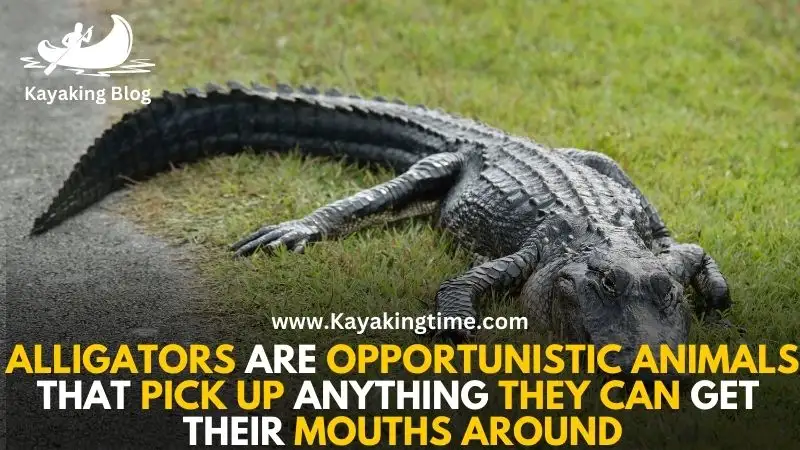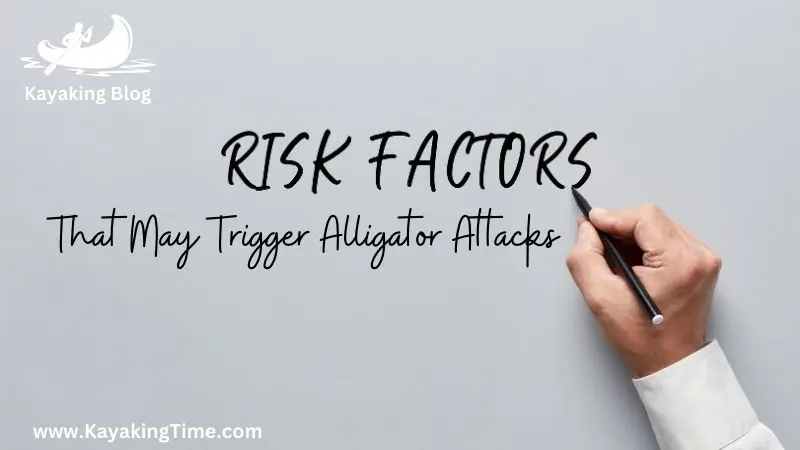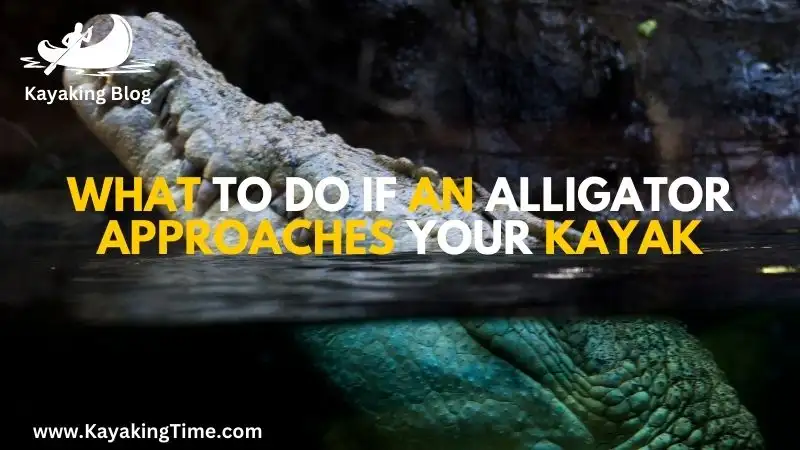Do Alligators Attack Kayaks or kayakers, Small Boats and Paddle Boards? Learn What to Do in a Florida Alligator Attack
Alligators are dangerous animals that can kill people. However, they only attack people a few times. But do alligators attack kayaks? The answer is YES!
Most attacks on humans happen because someone was swimming in an area inhabited by alligators and didn’t realize it until too late (or if they were just unlucky). But there are still times when alligators attack boats–even small ones like kayaks or canoes!
This article will delve into alligators and kayaks; we’ll provide you with the essential knowledge to ensure your safety and success as a kayaking enthusiast.
Do alligators attack kayaks?
The answer is yes and no. Alligators are not aggressive but can be dangerous to humans and kayaks.
For your information, in Florida, alligators are common and well-known to most people as nuisance animal that lives in rivers, swamps, ponds, and lakes, as I have mentioned above.
They’re also known for their ability to kill humans if they feel threatened or annoyed by us (which happens more often than you might think).
However, the reality is most attacks happen at night. This typically occurs when an individual attempts to photograph an alligator feeding, unaware of another one lurking behind nearby bushes.
The person is unknowingly putting themselves at risk, heightened by their fear of becoming prey themselves.
Understating Alligators Behaviour
Disclaimer: Scary content ahead!

Alligators are opportunistic animals that pick up anything they can get their mouths around. You cannot escape an alligator attack if you’re in a kayak.
They don’t care about your screams or attempts at escape; they just want to eat as much human flesh as possible before being killed by a hunter or another animal.
Alligators also love fish and birds—even if it’s just one little bird! If there are any small creatures around, even though they might be annoying bugs or other pests (like mosquitos), this means more food for the alligator family!
It’s important to remember that these reptiles may look friendly but still need to be treated cautiously; they’re not known for being gentle during dinner time at home (or wherever else).
However, certain factors can also trigger the aggressive behavior of alligators, potentially leading to an attack. Let’s have a look!
Factors That May Trigger Alligator Attacks
Alligators usually display aggression when they feel threatened or perceive their territory as invaded. Some factors that may provoke an alligator to attack a kayak include

1- Protecting their nest or young
Alligators may become more aggressive if they perceive a threat to their nests or young offspring, as they exhibit protective behavior to ensure their survival.
2- Feeling cornered or surprised
When alligators feel trapped or unexpectedly encounter a kayaker nearby, their instinct may be to defend themselves, potentially leading to aggressive behavior.
3- Associating kayaks with food sources
Alligators are opportunistic feeders and may associate kayaks with potential food sources, especially if people have fed them in the past, leading to potentially aggressive interactions.
4- Establishing dominance over perceived intruders
Alligators may engage in aggressive behavior to establish dominance or protect their territory when they perceive kayakers as intruders in their environment.
5- Seasonal variations, such as mating or nesting periods
During specific times of the year, such as mating or nesting seasons, alligators can display heightened territorial behavior or become more aggressive to protect their mates or nesting sites.
What to Do If an Alligator Approaches Your Kayak
You’re in a kayak, and you see an alligator. What do you do? If your answer is “run away,” that’s wrong. Alligators are fast swimmers who can easily catch up to a small boat like yours.

They’ll also be able to get close enough to bite at your legs or feet if they want (the average adult male alligator has teeth that grow up to about 12 inches long).
If running away isn’t an option for some reason—maybe because there’s no shoreline nearby so do this instead.
1- Remain calm and avoid sudden movements.
2- Back away slowly, creating distance between you and the alligator.
3- Do not attempt to feed or interact with the alligator.
4- If the alligator persists, —you’ll have no choice but to fight back against the alligator with whatever weapons are available: sticks and rocks if possible; anything else that might help distract him long enough for help to arrive!
5- Avoiding wild alligators or carrying a rifle when out on a walk or fishing excursion are the best ways to defend oneself from an alligator attack.
And If you are considering these regions, please go through this table and then make your decision.
Regions to Consider Before Kayaking for Alligator/Crocodile Awareness
| Country | Regions | Alligator/Crocodile Information |
| USA | Southeastern United States (Florida, Louisiana, Georgia, Alabama, and Mississippi) | Known for alligator population. Pay attention to waterways, swamps, marshes, and lakes. |
| Australia | Northern parts (Queensland, Northern Territory, and Western Australia) | Home to saltwater crocodiles. Be cautious in coastal areas, rivers, and estuaries. Watch for signs and warnings. |
| Canada | Wildlife parks, sanctuaries | Some parks may have captive alligators. Check for guidelines and safety precautions. |
| Africa | South Africa (Limpopo River and the iSimangaliso Wetland Park) | Crocodiles are present in rivers, lakes, and estuaries. Take precautions while kayaking. |
How To Stay Safe If You Or Your Family Do Come Across An Alligator
Remember the following things if you’re kayaking or canoeing alone or with your family.
- Don’t make sudden movements like jumping out of your boat or removing your helmet. Let him/her know that you’re there by waving and making eye contact. This will help them realize they aren’t being attacked by a predator (like a shark). They may also wonder why there’s another person on their turf!
- Don’t swim away from the alligator too fast—you might hit it with your paddle if it tries to attack in retaliation! Instead, paddle slowly around so as not to alarm him/her further; this should be enough for them to realize there’s no threat here.
What Are The Best Ways To Protect Yourself If A River Rises And Alligators Are Around?
If you find yourself in a situation where an alligator is around, there are several ways to protect yourself. First, stay calm and don’t try to outrun or fight the animal.
Second, don’t swim away from the alligator. Third, don’t grab its tail because this will cause it to flip over and bite you on your legs or arms!
How Can One Avoid Being Attacked By An Alligator While Kayaking?
- Do not swim in the middle of the river.
- Do not paddle too close to the bank.
- Do not paddle too close to other people, especially if they are kayaking with you.
- Do not paddle near boats or other aquatic animals such as crocodiles or turtles (or even turtles!).
It is also a good idea to keep your distance from larger watercraft since these can cause alligators’ natural instinctive fear of humans when it comes time for them to defend themselves from being attacked by predators like bears and wolves looking for food in your territory!
Is It True That An Alligator’s Jaws Are Strong Enough To Grip A Kayak?
Alligators and crocodiles are both predators. They have powerful jaws and teeth, meaning they can bite through anything smaller than them, including boats and kayaks.
However, this doesn’t mean that alligators will attack kayaks—it just means they might try to eat them if they see you in your boat!
Conclusion | Do Alligators Attack Kayaks?
As you can see, researching before heading out on a kayak or canoe is important. If you’re going out alone or with your family, ensure everyone knows what they are doing and how to stay safe if an alligator attacks.
We hope this article has helped you understand why alligators attack kayaks!
FAQs | Do Alligators Attack Kayaks?
q. Are alligators more likely to attack kayaks with bright colors?
While alligators are more attracted to movement than specific colors, it’s generally recommended to avoid bright colors that may draw their attention.
q. Are there any repellents available to deter alligators while kayaking?
No, there are no repellents specifically designed to deter alligators. It’s best to rely on safety precautions and avoid provoking them.
q. Is kayaking alone in alligator territory dangerous?
It is generally safer to kayak with a partner or in a group, as having others around can assist in an emergency.
q. Can I kayak at night in alligator-infested waters?
It is not recommended to kayak at night in areas inhabited by alligators, as visibility decreases, increasing the risk of unexpected encounters.
q. How can I avoid alligator encounters while kayaking?
Avoid paddling in known alligator habitats to reduce the likelihood of alligator encounters, especially during their active periods. Stay alert, keep a safe distance from alligators, and avoid feeding or approaching them.
q. What should I do if I encounter an alligator while kayaking?
If you come across an alligator, remain calm and give it space. Do not approach or provoke the alligator. Back away slowly, keeping a safe distance. Most importantly, never feed or try to interact with wild alligators.
q. Can alligators capsize or attack kayaks?
Alligators typically do not view kayaks as prey, and unprovoked attacks are extremely rare. However, if you encounter an aggressive alligator, paddle away steadily and seek safety on land. Remember, prevention and caution are key.
q. What safety measures should I take when kayaking in alligator habitats?
Always inform someone about your plans and expected return time when kayaking in alligator-inhabited areas. Wear a personal flotation device (PFD), stay alert, avoid kayaking alone, and always be aware of your surroundings.
q. Can kayaking with dogs attract alligators?
Bringing dogs on kayaking trips can potentially attract alligators. Dogs should be kept on a leash and away from the water to minimize risk. Alligators may perceive dogs as threats or potential prey.
q. Are there any specific times of the year when alligator encounters are more common?
Alligator encounters may be more likely during mating and nesting seasons when alligators are more territorial and protective. Be extra cautious during these periods and heed any local advisories or warnings.
q. Is it safe to fish from a kayak in alligator-populated waters?
Fishing from a kayak in alligator-populated waters is generally safe if proper precautions are taken. Avoid cleaning fish near the kayak and dispose of any fish waste appropriately, as the scent can attract alligators.
q. Can kayaks scare away alligators?
Alligators usually try to avoid human encounters and may retreat when they hear or see kayaks approaching. However, it’s important to remember that alligators are wild animals, and their behavior can be unpredictable. Maintain a safe distance and observe them from afar.
q. Are there any additional safety tips for kayaking in alligator habitats?
In addition to keeping a safe distance from alligators, it’s advisable to avoid paddling near alligator nests, submerged logs, or vegetation where alligators may hide. Stay knowledgeable about local regulations and guidelines for kayaking in alligator-inhabited areas.






